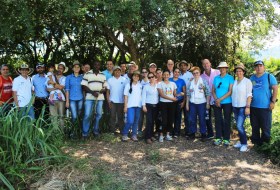News
UNICAUCAN Researchers Make Valuable Contribution to the Cattle Ranchers of the Sourther Region of Colombia
Popayán, Tuesday, June 6, 2017
On Monday, June 5th an interdisciplinary team of professors, part of the Faculty of Agricultural Sciences of the University of Cauca, visited several of the farms located in the rural area of Patía, south of the Cauca department (state), where the Group of Nutrition Agropecuaria - Nutrifaca , of UNICAUCA, advances projects that aim at improving livestock activity from investigation around a species forage and its resistance to climatic conditions.
"Since 2006 we have been working towards eco-efficient livestock farming, we are looking at how to bring livestock farming that is inefficient in dry times, to efficient in cattle ranches. We have worked with the Cooperativa de Usuarios Campesinos del Patía - Coagrousuarios, with the Association of Cattle Ranchers - Asogamer, and joined them with associations of women producers from El Estrecho and Angulo, also with schools, some agricultural related, "said Professor Nelson José Vivas Quila, director of the aforementioned research group.
The projects, financed by the Colombian General System of Royalties and under the execution of the Cauca Government, are supported by the municipal governments of Patía, Mercaderes and the International Center for Tropical Agriculture (CIAT).
In total there are 70 properties in which the investigative research is carried out simultaneously, belonging to the two populations. According to Professor Vivas Quila, "we work in areas with poor soil and look for species (forage) that is tolerant to prolonged dry periods such as those in Patía."
Among species, some are brought from africa, which have being successful when raising them in zones with similar climate conditions to those of the Patía Valley, as it is the north of Mexico.
Noelí Angulo Mosquera, legal representative of the Cooperativa de Usuarios Campesinos del Patía, and who has been part of the project, stressed that it has been a very productive intervention.
"This changed, they were angleton pastures, and today the transformation there is new and very successful fodder within the program. In addition to this, there’s also a theoretical practical training has been given, community participation. Within the cooperative this has been the benchmark to be able to continue ahead what we were doing (...) we see that we can have more animals by the area, grass more resistant to drought and also to winter," he said.
It is also worth noting that the activities are linked to undergraduate students, in areas such as agroecosystems, integrated production systems, ecology, and agricultural nutrition, which strengthens the university educational process through a seedbed of research.
Meanwhile, as this relates to postgraduates, professionals in this area of study have the possibility of developing their own contributions. Currently, 11 master theses from the Universidad del Cauca, Universidad del Valle, Universidad Nacional and Hohenheim University in Germany are linked to the projects.
Making part of this initiative also are two doctoral theses. One, from the National University, based in Palmira, led by Juliana Carvajal, entitled 'Agronomic, nutritional and environmental assessment of 130 accessions of Megathyrsus maximus (Pasto guinea, or Tanzania pasture) in the Patía Valley', seeking to establish which variable Is better conditioned to climate characteristics of the area and thus promote planting the most resistant.
From Unicauca, Carlos Martínez, fourth semester Ph.D. in Agrarian and Agro-industrial Sciences, carries out a thesis titled 'Evaluation of new novel strategies for the strengthening of cattlemen from the Patía Valley', which has to do with associating Forage species using grasses and legumes on grasslands that contribute to improve forage productive yields, whether green or dry matter, allowing adequate nutrition for animals, according to the author.
Professor Jesus Eduardo Bravo, dean of the Faculty of Agricultural Sciences, highlighted the social impact of the initiative, synergy with government entities and countless contribution that from an interdisciplinary collective seek to improve livestock and the living conditions of the community of southern Cauca.
More information:
Faculty of Agricultural Sciences
Vereda las Guacas - Popayán
Phone: 8245976-78-79 - Ext. 101
Email: facagro@unicauca.edu.co


